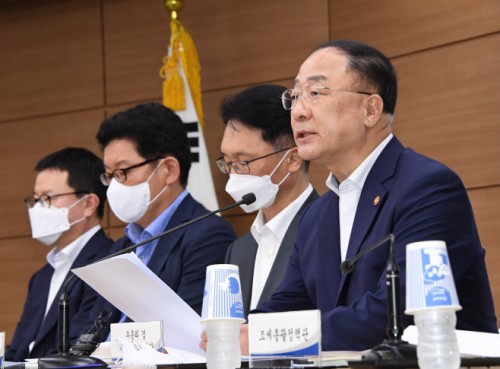 |
| Deputy Prime Minister and Finance Minister Hong Nam-ki speaks during a press briefing at Sejong Government Complex on July 20, 2020./ Source: The Ministry of Economy and Finance |
AsiaToday reporter Cho Sang-eun
The government’s latest tax revision plan announced by the Tax Development Review Committee on Wednesday seeks to revitalize the economy in the post-coronavirus era.
“A revision of the tax code is aimed at preemptively coping with a post-coronavirus pandemic world, while helping overcome an economic crisis to become a leading economy,” Deputy Prime Minister and Finance Minister Hong Nam-ki said in a press briefing at Sejong Government Complex on Tuesday. “We will fundamentally change the nation’s tax policies so as to better support people and businesses having a tough time with the COVID-19 crisis.”
The tax revision plan focuses on establishing an inclusive base and strengthening coexistence and fairness.
Under the plan, the government will lower the stock transaction tax, raise the standard amount for VAT evaluation of simplified taxpayers to make those making annual sales of less than 80 million won eligible from the current 48 million won, provide another two years of income tax for small and medium-sized enterprises, and strengthen taxes on property ownership.
What’s eye-catching is that the government has introduced a tax on income generated from cryptocurrency transactions while raising individual consumption tax rate on liquid e-cigarettes.
With the tax revision, around 69.6 billion won in net tax revenue increase is forecasted for the next five years from 2021 to 2025.
The factors for tax revenue increase include the expansion of stock transfer tax, an increase of comprehensive real estate rate, and an increase in income tax rate.
On the other hand, the reduction of the securities transaction tax, the expansion of investment tax credit, and the elevation of the standard value of simple VAT are expected to reduce tax revenues.
The middle class and small- and medium-sized enterprises (SMEs) are expected to see over 1.7 trillion won in tax reduction whereas high earners and large conglomerates will see 1.8 trillion won increase for the next five years.
#tax revision #post-coronavirus
Copyright by Asiatoday
Most Read
-
1
-
2
-
3
-
4
-
5
-
6
-
7





















